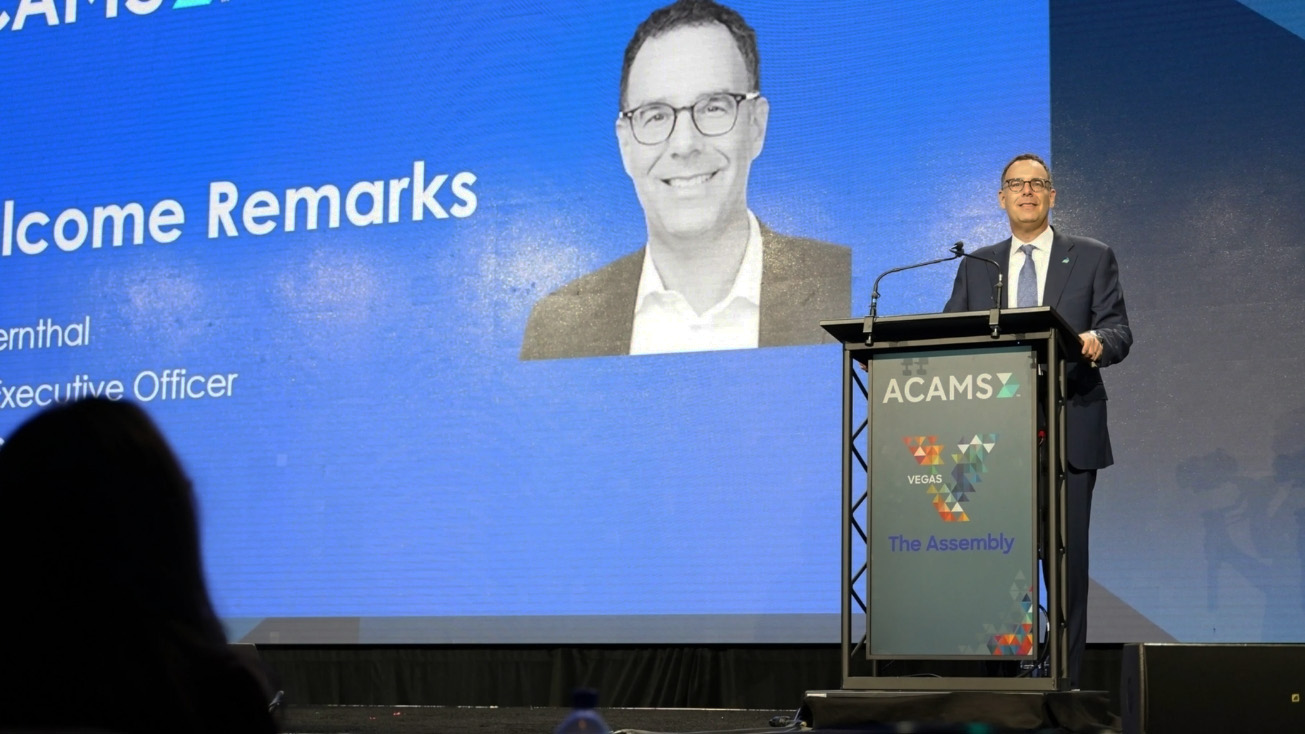
From September 16-18, ACAMS hosted its annual The Assembly Las Vegas at the Aria Resort and Casino. This premiere anti-financial crime (AFC) event featured three days filled with keynotes, panel sessions and discussions of front-of-mind topics including AFC regulation, artificial intelligence (AI), elder financial abuse, fraud, sextortion, suspicious activity reports (SARs), as well as fentanyl trafficking and drug cartels.
Day one: Keynote address and sessions
One of the highlights of The Assembly took place the first morning of the conference. Following a welcome to the in-person and virtual audience by ACAMS CEO Neil Sternthal. John K. Hurley, Undersecretary of the Treasury for Terrorism and Financial Intelligence at the Department of the Treasury, discussed the department’s new approach regarding the Bank Secrecy Act (BSA) and SARs during his keynote address.
“Having spent most of my adult life building a financial services firm, pretty quickly I was able to understand and empathize with the many, many problems with the current system,” Hurley told the audience. “I have also felt the sincerity of your commitment to the vital role you play and the maddening frustration you feel when that system undermines that mission by forcing you to waste time and resources. The purpose of the BSA is to combat money laundering and terror financing by requiring financial institutions [FIs] to provide highly useful information to the government. SARs and CTRs are the primary vehicles of that information. As everyone in this field knows, there are useful SARs and not-so-useful SARs, and regulatory pressure has led to more and more of the not-so-useful SARs.”
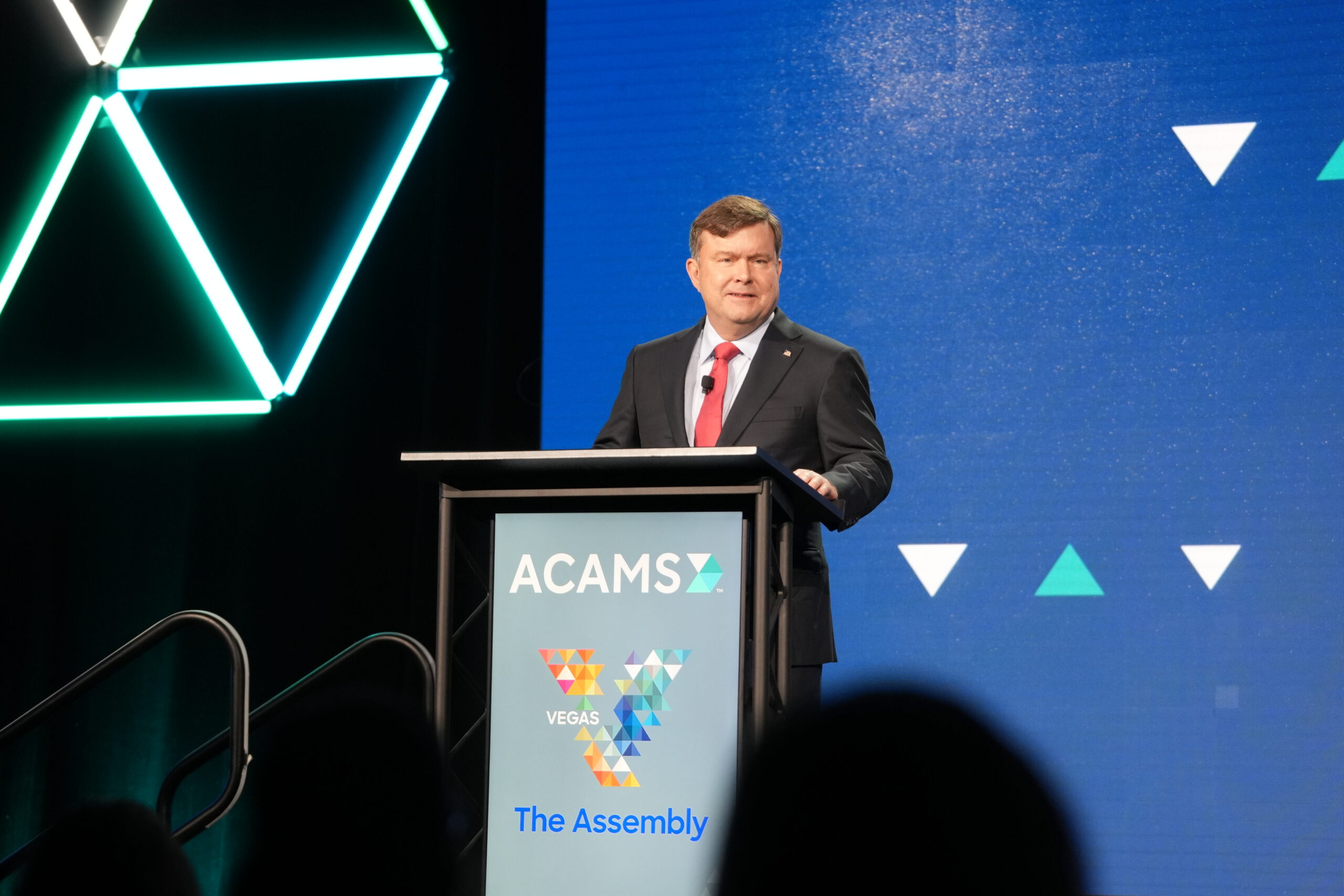
Noting that the complexity of SARs is an additional challenge for FIs as the instructions for completing them are 170 pages in length and that better communication should be encouraged between FIs and law enforcement (LE) and national security agencies, Hurley observed, “They and we need to let you know what is valuable and what is a waste of time and cut the time between you seeing it and them knowing it. So, our concept for reforming the system is simple. First, [LE] and the national security establishment are the customers of our [anti-money laundering/countering the financing of terrorism (AML/CFT)] system and our North Star will remain laser-focused on that customer. Second, AML/CFT programs should deliver better outcomes by providing those customers with the most useful information, not by overwhelming the system with noise. And finally, compliance takes real resources. That’s why prioritization matters. Limited resources should be allocated to the most pressing threats.”
As he continued, Hurley assured the audience “that we in the leadership team at Treasury under President Trump are deeply committed to getting this right and believe we have a once-in-a-generation opportunity to do so. Importantly, we believe that we must not only establish sensible and clearly articulated rules, but we must also reform the examination system to ensure that those evaluating you are doing so in a manner that is consistent with those policies. To do that we intend to replace subjective assessments of process with objective measures of output.” Click here to hear his complete remarks.
During the session that followed, “Regulatory Roundtable: Direction and Discussion, Straight from the Source,” James Martinelli, associate director of the Financial Crimes Enforcement Network commented on Hurley’s presentation by saying, “I think what you're hearing from Undersecretary Hurley, from Secretary Bessent and others in Treasury leadership is that there is an urgent need for reform of the BSA … because [it has been recognized] that the system has not been comprehensively updated in a number of decades.”
Also at the session, as part of a discussion of practicing “the risk-based approach,” fellow panelist Christy Cornell-Pape, CAMS, of the Federal Deposit Insurance Corporation introduced an analogy that quickly spread throughout The Assembly. If an FI were a zoo, would it spend its time and resources securing its flamingos, of which there were many but were not a safety issue? Or would the institution concern itself with securing its tigers, which were few in number but much more perilous? The answer was obvious: Monitoring the tigers would be a much higher priority.
Later that day, the session “All Aboard: Low-Risk Moves That Let Smaller Institutions Harness the Power of AI,” Patrick Kirwin, head of product management at Silent Eight, provided two key takeaways for the audience. The first was for them to “consider adopting cloud as a good way to get a head start on your AI programs if you’re a smaller institution.” Second, he advised them to “be very, very clear about the problem that you want to solve before you bring in an AI solution … rather than looking for an AI solution for a problem you don’t have.”
Day two kicks off with ACAMS Awards presentations
Wednesday’s program in Las Vegas began with the presentation of several ACAMS Awards. During the ceremony—where the award winners were announced by ACAMS’ Director of Editorial Content Kieran Beer, CAMS, and the awards were presented by ACAMS’ CEO Neil Sternhal. Matthew Hasslinger, Esq., CAMS, of M&T Bank received the 2025 ACAMS AFC Professional of the Year Award, while Oksana Ihnatenko, CAMS, a managing director at the Center for Financial Integrity in Ukraine, accepted the ACAMS AFC Rising Professional of the Year Award. In addition, Mavis Bennett, a compliance professional from New York City, was presented with the ACAMS Today Article of the Year Award, and the ACAMS South Florida Chapter was honored as the ACAMS Chapter of the Year.
Sextortion was explored at Wednesday’s keynote
The awards ceremony was followed by the keynote presentation, “Sextortion: Navigating the Digital Pandemic,” which featured cyber intelligence analyst Paul Raffile. During the session, Raffile detailed the growing problem of the financial sextortion of minors by criminal gangs. Describing the scheme as “the world’s deadliest scam,” Raffile noted some statistics from Snapchat, including that there were more than 52 teen suicides since the fourth quarter of 2021, with 37 of those deaths occurring in the U.S. Regarding how quickly it is growing, during 2021 there were only 139 reported cases of financially motivated sextortion targeting minors in the U.S. and now there are 600 cases filed every week, with 90% of male victims ages 14 to 17. Among the takeaways from the session were that this is the largest blackmail operation in history as well as a public safety and national security emergency. As for what can be done, Raffile said, “Protect your families. Protect your communities. Protect your organizations.”

Later in the morning, the session “The First to Know: AI Developments That Will Be Next Year’s Buzzwords” discussed the rapid growth of AI and generative AI over the past two years as well as what trends are expected to emerge over the next year. During the session, panelist Anwar Chaudhry, head of AI and Content Technology at ACAMS, was asked how financial professionals could learn how to begin using AI. He responded, “I got into AI about 10 years ago [when] I was in software…. YouTube was amazing for [learning] AI. There are a lot of great beginner's level courses on how to use AI assistants in your day-to-day. Stanford University does a great series of courses on this as well. [There are] a lot of great resources once you're motivated to do so.”
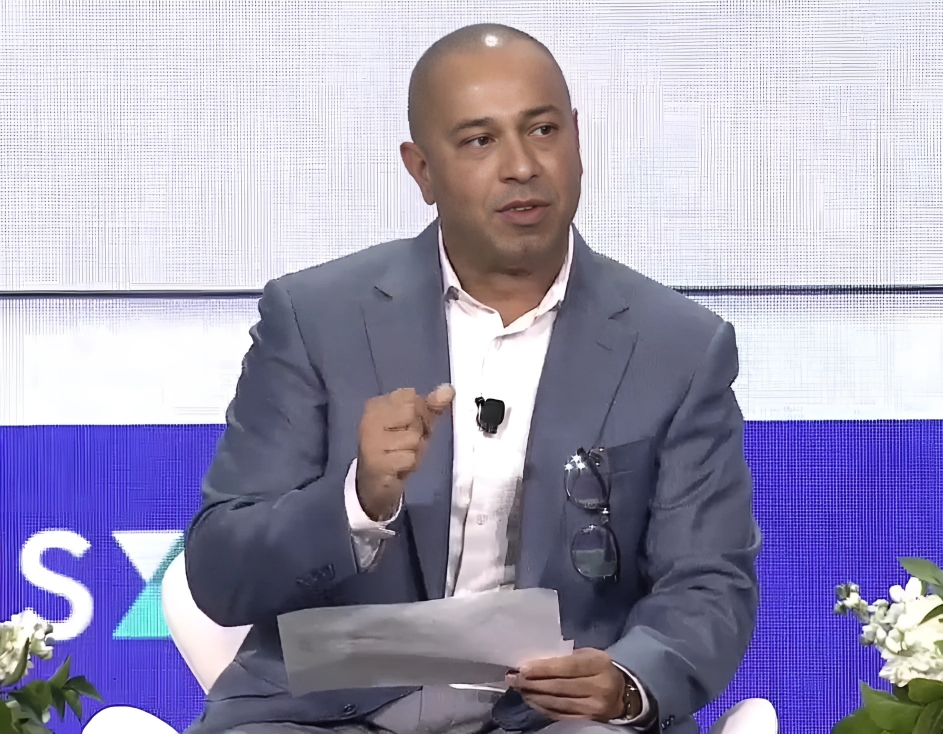
The importance of team training
At “People Power, Not People Problems” that afternoon, the session’s participants discussed how institutions could ensure that their compliance teams can be equipped to cope with growth and change. When asked how she approached individual versus team-wide development training, Kate Salottolo, vice president, global head of AML and Brand Risk Management at PayPal (pictured second from left below), answered, “It’s always a challenge to cater to all the individual types of roles that we have in these programs. But I think it’s the same in terms of how to structure the program itself. There’s a certain amount of horizontal knowledge that I think every team within the organization needs to have and it’s that baseline training of who we are as a company. What’s our mission for the program? What are the core components of the program … getting to that next level down of how we execute end-to-end….”

Day three: Economic warfare and the fight against drug trafficking
The final day of the conference began with a special presentation from Edward Fishman, a professor at Columbia University and the author of Chokepoints: American Power in the Age of Economic Warfare. Fishman, who is currently a professor at Columbia University, started working at the Treasury Department in 2011 in the office of the Undersecretary for Terrorism and Financial Intelligence before moving to the State Department to work on sanctions against Iran and then becoming the lead on Russian sanctions following the Russian invasion of Ukraine in 2014.
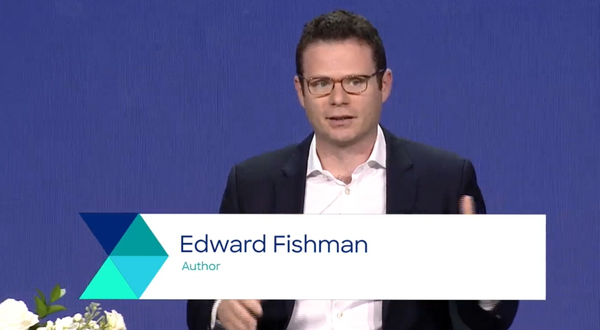
During the presentation, which was moderated by John E. Smith of Morrison Foerster’s National Security Practice, Fishman discussed the development of economic warfare through sanctions over the past few decades. “What changed was in the wake of hyper globalization in the ‘90s, when you get deeply integrated financial systems [and] supply chains, you have the creation of these chokepoints where there are single points of failure in the global economy, where a country like the [U.S.] that controls them can actually deploy substantial economic pain on a foreign country without putting any troops in harm's way,” he said. “So, what we have today, when we want to [impose] oil sanctions on Iran, we're not relying on the U.S. Navy. What we're doing is we're actually just manipulating the financial system. We're trying to pressure banks in foreign countries. And now, in order for President Trump, for instance, to try to [inflict] pain on Mexican banks or on Iranian banks, it's as simple as signing an executive order in the Oval Office” or the director of the Office of Foreign Assets Control adding new sanctions, he said.
Later Thursday morning, during the session “Fentanyl, Cartels, China: A Unifying Theory of U.S. Policy Under Trump,” panelists discussed the Trump administration’s heightened focus on drug trafficking, cartels and China.
At the session, David S. Olesky, CAMS, from the DEA, observed that while AFC professionals crave detailed insights into fentanyl-related transactions, the challenge lies in the shifting value of the drug, which varies dramatically from state to state.
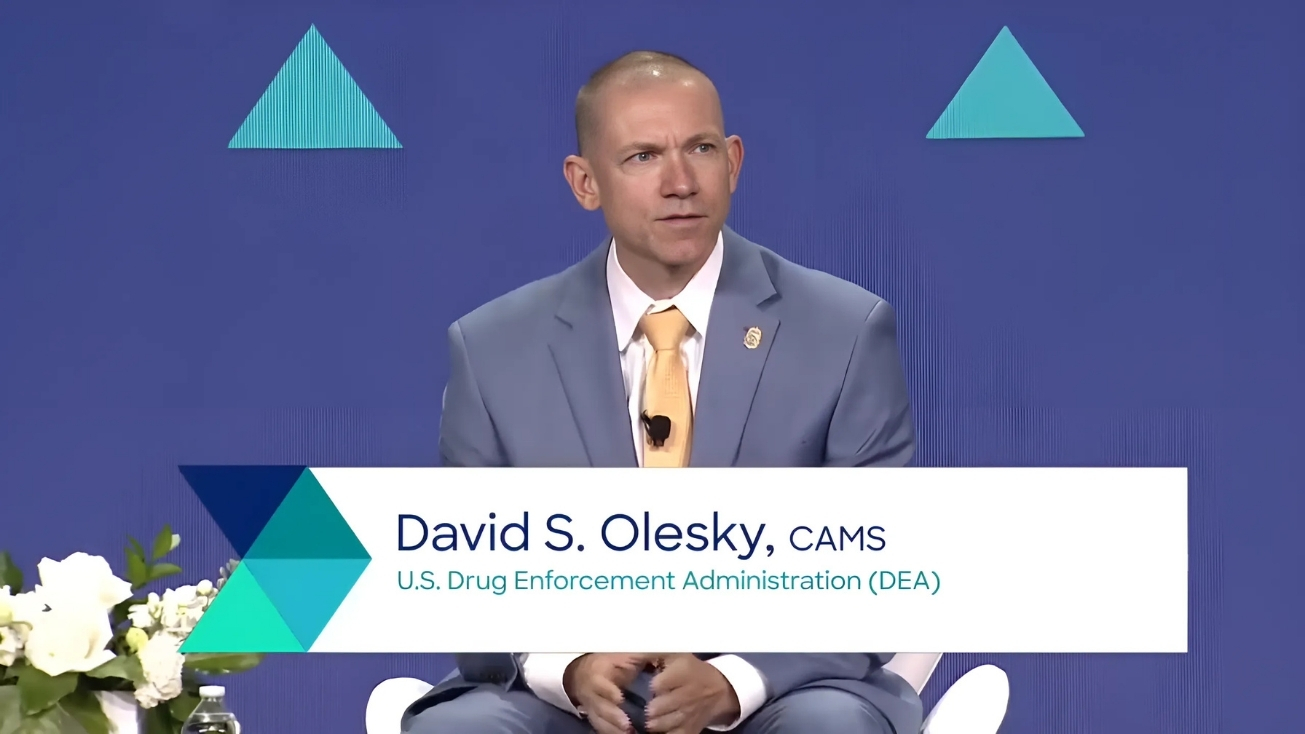
Highlighting the importance of information sharing in the fight against drug trafficking and cartels, Nicholas J. Schumann, CAMS, of HSBC commented, “I think we're in a place today that's very different from 10, 15, 20 years ago. There's more private to private and public-private information sharing taking place today than ever before. It's very dynamic. It's very proactive. And it's absolutely essential to helping [FIs] gain the context that they need to better understand the data [and] to better understand the transactions that are going through their institution.”
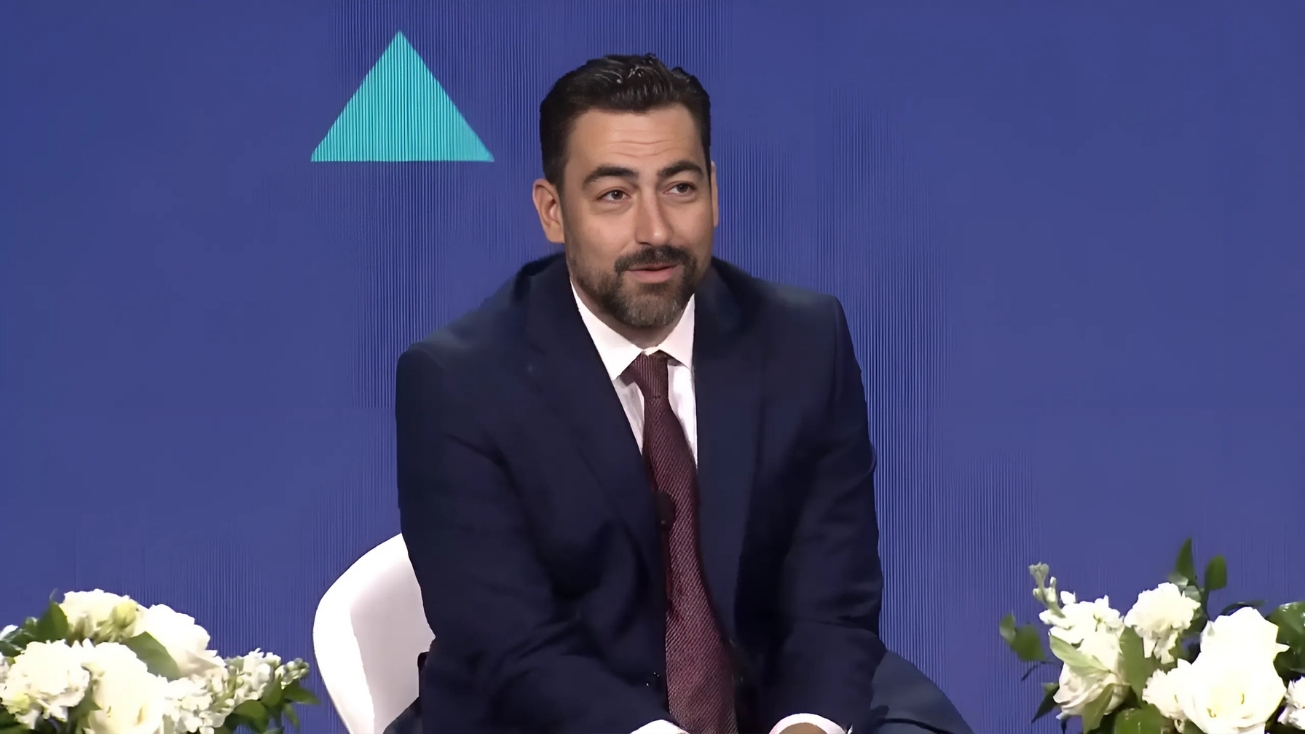
The conference ended on a high note with a fast-paced, informative and entertaining session addressing timely topics, “Breaking News: ACAMS MLDC Presents the Latest Developments in AML/AFC,” which was moderated by Colby Adams of ACAMSMoneylaundering.com and featured panelists Heather Cody of SoFi and Scott Nathan of TD Bank. Following that final presentation, it was announced that next year’s The Assembly Las Vegas will be held from September 29 through October 1.
Reported by the ACAMS Today Editorial Staff
Karla Monterrosa-Yancey, CAMS, editor-in-chief, kmonterrosa@acams.org
Ben Bahner, CAMS, editor, bbahner@acams.org
Monica Mendez, CAMS, consultant
Ana Acuna, web producer, aacuna@acams.org







